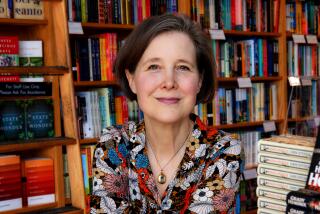Terry Pratchett, author of fantasy ‘Discworld’ series, dies at 66
At 17, English fantasy writer Terry Pratchett started his first novel, “The Carpet People,” which was published in 1971. The characters were tiny but had all the inherent frailties, foibles and longings of humans.
“If they were too different from us, we can’t sympathize with them in any way,” Pratchett said in a 2013 interview on National Public Radio. “They’re in a carpet, and that’s it. But they don’t know they’re in a carpet. To them, it’s like this great big forest.
“I was younger in those days.”
More than 70 books later, Pratchett’s writing — though populated with witches, wizards, trolls, dragons, vampires, elves, the tooth fairy and a character called Death who spoke in all capital letters — was still infused with the humanity and wry humor that made him one of the United Kingdom’s most popular writers.
Pratchett, 66, died Thursday at his home near Salisbury in southern central England. The cause was a chest infection and worsening effects of dementia, according to Transworld Publishers.
In 2007, Pratchett was diagnosed with posterior cortical atrophy, a rare form of early-onset Alzheimer’s disease. Although the condition eventually affected his eyes in a way that made it nearly impossible for him to read, he continued to write by dictation.
His most recently published book, “Raising Steam,” the 40th in his “Discworld” series, came out in 2013. He completed a final novel last year, Transworld said.
Pratchett won a 2008 Los Angeles Times Book Prize for his young adult novel, “Nation,” which takes place on a mythical South Seas island in the 19th century. The plot revolves around an island-born boy and shipwrecked girl, from very different cultures, trying to survive a natural disaster.
He accepted the award in a videotaped message from a slightly disheveled, book-filled office with a large cat perched on the desk.
“It was like being shackled by one leg to a bulldozer,” the white-bearded Pratchett said about writing the novel as the scene-stealing cat looked ready to pounce. “It just bound its way across the landscape, but it was up to me to keep up with it and bang my head on the trees as we rode across.”
Though “Nation” was aimed at young adults, the Guardian in London said the book “has profound, subtle and original things to say about the interplay between tradition and knowledge, faith and questioning.”
With his books regularly hitting the top of best-seller lists in England, Pratchett was likely that country’s most popular novelist until the arrival of J.K. Rowling’s “Harry Potter” tales in the 1990s. He took Rowling’s rise with customary humor, wearing a T-shirt to fan conventions that read, “Tolkien’s Dead, J.K. Rowling said no,” and then in small letters, “Hi, I’m Terry Pratchett.”
Pratchett, who was knighted in 2009, never won a major U.K. literary prize, though he had no less a defender than celebrated novelist A.S. Byatt. “He’s better than many literary writers,” she said in a 1997 London Times interview. “There are some best-selling authors whose sentences are like lumps of stone, but with Pratchett there’s always something to make you laugh every couple pages.”
He was born April 28, 1948, in Beaconsfield about 25 miles from London. His first published story, “The Hades Business,” about the devil convincing people to come to hell, was published in a school magazine. The headmaster publicly denounced the story’s “moral tone,” and the magazine sold out.
He left school at 17 to take a job as a reporter on a small newspaper, writing fiction in his spare time. “The Colour of Magic,” his first novel set in the fantasy land of Discworld, was published in 1983 and a few years later he was able to quit his day job and write full time.
In the years after his diagnosis, Pratchett spoke openly of his condition and supported not only Alzheimer’s but also right-to-die causes. But his character Death doesn’t appear in his last published book, “Raising Steam.”
“It’s not deliberate,” he told the Telegraph in 2013 with a laugh, “but I don’t want to be a death fetishist.”
His survivors include his wife, Lyn, and their daughter, Rhianna.
Twitter: @davidcolker
More to Read
Start your day right
Sign up for Essential California for the L.A. Times biggest news, features and recommendations in your inbox six days a week.
You may occasionally receive promotional content from the Los Angeles Times.







